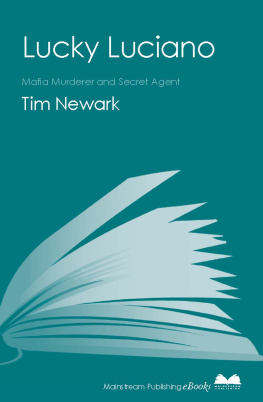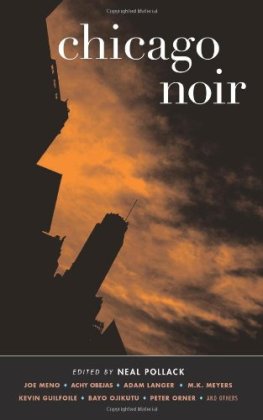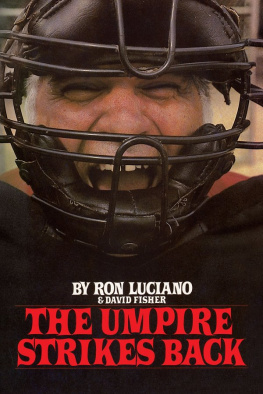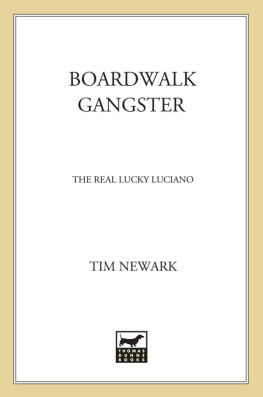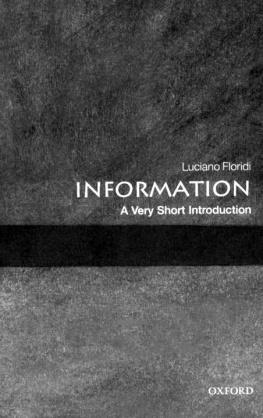The
Last Testament
of
Lucky Luciano
Also published by Enigma Books
Hitlers Foreign Policy: 19331939The Road to World War II
The Origins of Fascist Ideology 19181925
Max Corvo: OSS Italy 19421945
Secret Intelligence and the Holocaust
Balkan Inferno: Betrayal, War, and Intervention, 19902005
Calculated Risk: World War II Memoirs of General Mark Clark
The Murder of Maxim Gorky
The Kravchenko Case: One Mans War On Stalin
Operation Neptune
Paris Weekend
Shattered Sky
Hitlers Gift to France
The Mafia and the Allies
The Nazi Party, 1919-1945: A Complete History
Encyclopedia of Cold War Espionage, Spies, and Secret Operations
The Cicero Spy Affair
A Crate of Vodka
NOC
The First Iraq War: Britains Mesopotamian Campaign, 1914-1918
Becoming Winston Churchill
Hitlers Intelligence Chief: Walter Schellenberg
Salazar: A Political Biography
The Italian Brothers
Nazi Palestine
Code Name: Kalistrat
Pax Romana
The De Valera Deception
Lenin and His Comrades
Working with Napoleon
The Decision to Drop the Atomic Bomb
Target Hitler
Truman, MacArthur and the Korean War
Working with Napoleon
The Parsifal Pursuit
The Eichmann Trial Diary
American Police: A History
Cold Angel
Alphabet of Masks
The Gemini Agenda
Stalins Man in Canada
Hunting Down the Jews
Mussolini Warlord
Election Year 1968
American Police: A History, Vol. 2
Spy Lost
Deadly Sleep
The
Last Testament
of
Lucky Luciano
Martin A. Gosch
Richard Hammer
Enigma Books
To my darling Chip, without whom this book could not have been written and who was there from the beginning.
M. A. G.
And to Arlene.
R. H.
All rights reserved under
The International and Pan-American Copyright Conventions.
Published in the United States by
Enigma Books
New York
www.enigmabooks.com
No part of this publication may be reproduced, stored in a retrieval system, or transmitted, in any form or by any means, electronic, mechanical, photocopying, recording, or otherwise without the written permission of Enigma Books.
Copyright 2013 by Richard Hammer
eISBN: 978-1-936274-58-1
Contents
Early in 1961, Charles Lucky Luciano made a decision. He was then sixty-three and more than half his life had been devoted to crime, much of it as the overlord of the organized underworld in the United States; he had been its ruler even during fifteen years of exile in Italy. But at that moment, his position, whatever it was, was shaky. His health was not good: he had already suffered a major heart attack. And now his life had been threatened by his onetime friends and associates back in America.
Lucianos decision was that his passing should not go unattended, that the portraits painted of him in the past, which he considered at least partially untrue and greatly distorted, should not be the only ones left behind. Someday, he wanted the truth, as he saw it, told about his life, about his ambitions and how he had achieved them, about his crimes, about those he had known and dealt with; it should be told not at that moment but later, when retribution could no longer fall upon him or most of those directly involved in his life.
It was the decision, perhaps, of a bitter man. For some months he had been directly involved in a proposed motion picture loosely related to the later years of his life. It was the first time, despite the entreaties of film producers through the years, that he had ever authorized such a project or cooperated on one. On February 18, he had read the script and approved it and given his word that he would do all he could to help in its making; in return, he was to receive $100,000 and a percentage of whatever profits the movie earned. He had taken two copies of the script that day and sent one to an actor in Hollywood he wanted to portray him, keeping the second copy for himself.
Within a few days, however, he had received very unsettling news. Tommy Eboli, then the caretaker for the underworld interests of Vito Genovese, who was serving a term in federal prison for narcotics conspiracy, arrived in Naples with orders from New York. The rulers of the American underworld had decreed that there was to be no picture.
Luciano had little choice but to accede. He called Martin Gosch, one of the authors of this book, the coauthor of the screenplay and coproducer of the projected film, and asked him to return to Italy from London, where Gosch had gone on the Luciano project. Could you come down here? Luciano said. I have to talk to you, Marty.
Gosch knew that the request must, indeed, deal with something important, and he was just as certain that it must mean the movie deal was collapsing. Theres one thing I have to know, he said. Is there anything wrong with the deal on the picture?
Oh, no. No, nothins wrong with the picture. Everythings okay. But I gotta see you right away. Ill explain the whole thing when you get here.
By noon of the following day, February 26, 1961, Gosch was in Rome, had met Luciano at the Quirinale hotel. They did not stay there. Luciano took Goschs luggage and drove him back to the airport, most of the trip in silence. At the airport terminal, they went to the mezzanine restaurant. Luciano ordered spaghetti molto al dente. Gosch drank tea and watched while Luciano ate slowly and deliberately. Halfway through the meal, Luciano looked up. Marty, he said, could you call off the picture?
It was what Gosch had been expecting, but still it was a shock. For chrissake, why? I dont understand this and until I do, I simply have no answer for you.
Marty, I cant tell you. I think you gotta give up the picture.
Luciano spoke calmly, without emotion, and that distressed Gosch. Charlie, he said, youre supposed to be a man whose word is his bond. Ive heard over and over, Charlie Lucky promises this, Charlie Lucky says that, Charlie Lucky guarantees. Youre so proud of always keeping your word and now youve broken it to me, someone youve told everyone you like so much. Didnt you tell me on the phone last night that there was nothing wrong? You lied to me, Charlie.
Next page

